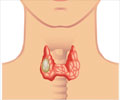Drug-resistant Papillary thyroid carcinoma (PTC) cancer may be treated with breast cancer drug. A research team at Harvard Medical School found.
- Papillary thyroid carcinoma (PTC) is the most frequent endocrine tumor.
- Most PTC patients develop drug-resistance and progress.
- A combination of vemurafenib and palbociclib is effective in treating PTC.
In lab-grown vemurafenib-resistant thyroid cancer cells, loss of the P16 gene - which prevents cells from dividing too often - may be linked to the ability of the cancer cells to continue growing even when treated with vemurafenib.
When the researchers treated cells from vemurafenib-resistant, BRAFV600E-positive PTC patients with a combination of vemurafenib and palbociclib, they found that drugs acted synergistically to induce stronger cell death than when either drug was used alone.
Combined therapy with vemurafenib plus palbociclib
Interestingly, in the course of the study, the researchers also identified that the cells harbored another deleterious genetic aberration that they propose may be a novel secondary mechanism of treatment resistance in cells that are already vemurafenib-resistant. Furthermore, they confirmed that that combined therapy with vemurafenib plus palbociclib results in a very efficient strategy to target PTC cells either with primary or secondary resistance.
"Our findings suggest for the first time that a combination drug therapy using vemurafenib and palbociclib represents a novel therapeutic strategy to treat PTC," said the lead author of the study Carmelo Nucera M.D., Ph.D., an assistant professor at Harvard Medical School.
References:
- Zeus A. Antonello1 and Nancy Hsu et al. Vemurafenib-resistance via de novo RBM genes mutations and chromosome 5 aberrations is overcome by combined therapy with palbociclib in thyroid carcinoma with BRAFV600E, Oncotargethttp://dx.doi.org/10.18632/oncotarget.21262
















